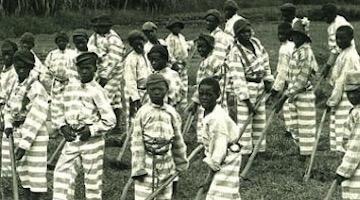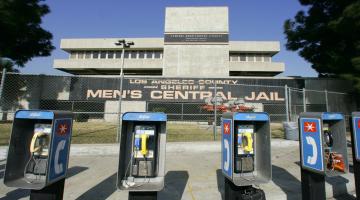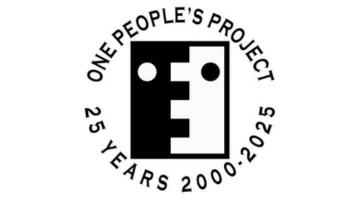Through a loophole in the 13th Amendment, governments and corporations profit from cheap, incarcerated labor.
“The punishment clause explicitly permits ‘slavery’ and ‘involuntary servitude’ as ‘punishment for crime.’”
Shawna Lynn Jones died in 2016, only hours after battling a fire in Southern California. She was nearly done with a three-year prison sentence—only two months remained of her incarceration. However, the night before, she and other women were called to put out a raging fire.
Jones was on a crew of incarcerated firefighters who routinely performed arduous and dangerous work; sometimes the women trudged heavy chains, saws, medical supplies, safety gear, and other equipment up burning hillsides surrounded by flames. On that night, the task was especially challenging, requiring the women to traverse a steep hillside of loose rocks and soil. One of the women later recounted how Shawna struggled, the weight of her gear and the chainsaw she carried made it difficult for her to establish solid footing to hike up the hill where the fire blazed.
Yet Shawna and the other women of her Malibu 13-3 crew performed their duties, holding back the fire so that it did not “jump the line” and burn homes on the other side. Their efforts saved expensive coastal properties in Malibu.
But by 10 a.m. the next morning, Shawna Jones was dead. The night before, while Shawna was on the hill clearing wood from the fire’s path, the earth above gave way, sending a rock down that struck her in the head and knocked her unconscious. She never woke up.
Sadly, there is nothing unique about Shawna’s death or that California works incarcerated women like her to the breaking point for less than $2 per hour. In some prisons and jails, people receive no pay or only pennies per hour for their labor.
In Alabama, incarcerated people earn no pay for what are referred to as “non-industry jobs,” although work programs facilitated by Alabama aid private industries (making couches, barbecue grills, and other items). Workers can earn $0.25 to $0.75 per hour, according to data collected by the Prison Policy Initiative in 2017.
“In some prisons and jails, people receive no pay or only pennies per hour for their labor.”
The same is true for Florida, while Arkansas and Georgia don’t pay for either non-industry nor private industry jobs. States that do pay for “non-industry” jobs do so with the most meager of wages: as little as $0.10 per hour in Arizona or $0.04 in Louisiana. Private industry jobs in these states might fetch under $1.00 per hour. In 2014, lawyers for the state of California resisted a court order to reduce prison populations by arguing that doing so would cut into the cheap labor available to clear trash, maintain parks, and fight forest fires—“a dangerous outcome while California is in the middle of a difficult fire season and severe drought,” the lawyers wrote.
If this sounds like modern day slavery to you, you are right. It is.
When I first read about Shawna, the image of Molly Williams came to mind. It’s an image I will never forget. Molly was the first female firefighter in the United States. She was enslaved, forced to put out fires in New York in the early 1800s. A chilling, undated rendering of Molly depicts this Black woman, without a coat and seemingly no gloves, pulling an engine (also known as a “pumper”) through thick snow and sleet, while white men in coats and top hats flee from the storm.
She doused flames while still tethered to the bondage of slavery and wearing a strange, gendered uniform consisting of nothing but her apron and calico dress. Molly’s “owner,” a wealthy New York merchant named Benjamin Aymar, conscribed her to these duties and that uniform. City officials and Aymar referred to Molly as a “volunteer” firefighter. However, like California’s incarcerated fire fighters, Molly could not simply walk off the “job” or lay down her burden.
Incarcerated female firefighters, like Shawna and Molly, are caught in the legacy of American slavery, which shockingly remains enshrined in our Constitution through a loophole in the 13th Amendment—a law that Congress ratified in 1865 to abolish slavery. This year marks its 155th anniversary.
This loophole, known as the punishment clause, explicitly permits “slavery” and “involuntary servitude” as “punishment for crime,” where the person has “been duly convicted.” At the time of its drafting, senators from slaveholding states vigilantly fought for a compromise that could allow for slavery’s continuance, and slavery has survived ever since—a largely unseen, deleterious plague that continues to infect our democracy.
“The legacy of American slavery remains enshrined in our Constitution.”
The author of the punishment clause, a Missouri slave owner named Senator John Brooks Henderson, favored adopting a law abolishing slavery that contained a punishment exception like The Northwest Ordinance of 1787, which prohibited slavery in the new western territory except “in the punishment of crimes whereof the party shall have been duly convicted.” Opposition efforts were futile. Senator Charles Sumner, a widely respected abolitionist, objected to the punishment clause and proposed an amendment based on France’s Declaration of the Rights of Man and of the Citizen that asserted the equality of all men. But legislators worried this could lead to wives claiming equality, and his amendment was shot down.
The 13th Amendment’s final version emerged from the Senate Judiciary Committee with Senator Henderson’s language, permitting both involuntary servitude and perpetual slavery as constitutionally sanctioned punishments for committing crimes. By the end of the year, Southern states enacted numerous “Black Codes,” criminal laws that only applied to “Blacks and Mullatoes.” This was clever; before ratification of the 13th Amendment, abolitionists could speak to the depravity of slaveholders who forced innocent Black children, women, and men into unpaid labor. After the 13th Amendment, incarcerated Black people would be called criminals and convicts—far less worthy of Northerners’ sympathy—although they were no different than before.
Thus, even while the 13th Amendment granted freedom to Black people trapped in slavery, Southern legislators, law enforcement, and private businesses reinvented the practice through new forms of servitude, bondage, and threat. Essentially, the punishment clause exception permitted the re-appropriation of Black bodies for non-compensated labor in Southern states and eventually for Northern ones too. Economist Jay Mandle referred to this condition as not enslaved but also not free. There were virtually no legal protections for newly freed Black people from labor exploitation, whether they were freed sharecroppers or newly stamped “convicts.”
The result was slavery’s expansion on Southern tenant plantations. According to economist Nancy Virts, tax record data showed the number of plantations in select Louisiana parishes increased by 286% between 1860 and 1880. Similarly, rather than shrinking after the abolition of slavery, Southern plantations increased in size, resulting in greater wealth production. During the early years of Jim Crow, tenant plantations increased their size (in acreage) in Alabama, Georgia, Louisiana, Mississippi, and South Carolina from 19 to 24%.
“The punishment clause exception permitted the re-appropriation of Black bodies for non-compensated labor.”
The Black Codes, along with the convict leasing system, which supplied cheap labor to coal mines and railways, drove this expansion of slave labor in the Southern economy. Profits were made all around, including by crooked prison wardens who negotiated special deals with coal mining executives, supplying the bodies of Black teenagers who landed in prison because they could not afford to pay fines for walking down a street, or standing with more than two friends on a corner. These children would be leased for up to 20 years—if they survived that long—to the tycoons of the nation’s most profitable industries.
In Alabama, lawmakers made it a crime for “free negroes and mulattoes” to assemble in a disorderly manner. Another Alabama Black Code made it “unlawful for any freedman, mulatto, or free person of color to own fire-arms, or carry a pistol under a penalty of a fine of $100.” And the Alabama law that abolished whipping as legal punishment replaced it with “hard labor for the county.”
Black Codes were exhaustive, covering all manner of freedoms associated with housing, family, sex, associations, farming, selling goods, and more. By the end of 1865, Alabama had amended its criminal statute to provide that Black people employed by farmers “shall not have the right to sell any corn, rise,[sic] peas, wheat, or other grains, any flour, cotton, fodder, hay, bacon, fresh meat of any kind, poultry of any kind, animal of any kind . . . .” Interestingly, this specific Alabama law, although amended after the 13th Amendment, still referred to “masters.” The copiously delineated exclusions of Black people from the social and economic life of Alabama counties confirmed the preservation of slavery, despite the 13th Amendment. Breaking any of the new criminal codes would return newly freed Black women and men to slavery, which was the point of such laws.
“Children would be leased for up to 20 years.”
Today, although Black Codes have been repealed, their legacy serves as the foundation for policing in America and the current misdemeanor system—from stop and frisks to “broken windows” policing that uses minor infractions to pull people into a system where their rights and freedoms quickly vanish. And the burdens of America’s prisons still fall disproportionately on Black people, their families, and their communities. Relying on these systems to provide free or below-poverty-wage labor, padding the coffers of both states and private corporations, is not rehabilitation. It’s slavery.
Surely, the purpose of prison is not to run sweatshops for big businesses or serve as car washes for the wardens. We can—and we must—do better.
At least one state is already paving the way. In 2018, Colorado took the lead in abolishing slavery through a constitutional amendment, declaring that “There shall never be in this state either slavery or involuntary servitude.” Members of Congress are also speaking up, including Oregon Senator Jeff Merkley, who is preparing to introduce a constitutional amendment to repeal the punishment clause. But more politicians need to recognize this grave injustice and repair it.
It’s long past time to fully abolish slavery—once and for all. As the late Congressman John Lewis said in his speech as part of the 1963 March on Washington, “We want our freedom and we want it now.”
Michele Bratcher Goodwin is a Chancellor’s Professor at the University of California, Irvine and founding director of the Center for Biotechnology and Global Health Policy. She is the recipient of the 2020-21 Distinguished Senior Faculty Award for Research, the highest honor bestowed by the University of California. She is also the first law professor at the University of California, Irvine to receive this award. She is an elected member of the American Law Institute as well as an elected Fellow of the American Bar Foundation and the Hastings Center (the organization central to the founding of bioethics). She is an American Law Institute Adviser for the Restatement Third of Torts: Remedies.
This analysis is part of our Discourse series. Discourse is a collaboration between The Appeal and The Justice Collaborative Institute. Its mission is to provide expert commentary and rigorous, pragmatic research especially for public officials, reporters, advocates, and scholars. The Appeal and The Justice Collaborative Institute are editorially independent projects of The Justice Collaborative.
This article previously appeared in The Appeal.
COMMENTS?
Please join the conversation on Black Agenda Report's Facebook page at http://facebook.com/blackagendareport



















